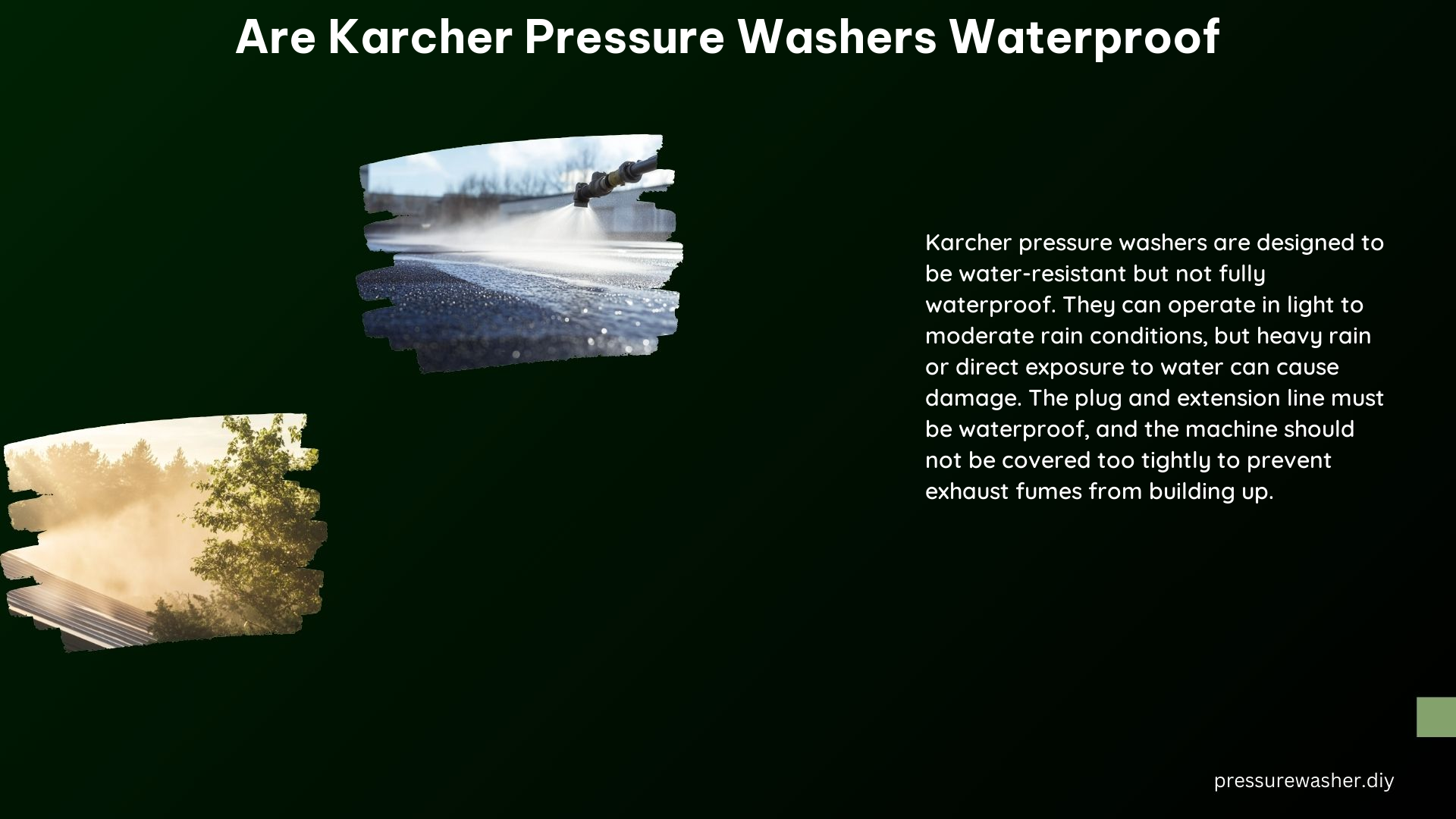Karcher, a renowned manufacturer of high-quality pressure washers, has designed its products to be water-resistant and capable of withstanding exposure to water. This article delves into the technical specifications, design features, and user experiences that make Karcher pressure washers a reliable choice for various outdoor cleaning tasks, even in wet conditions.
Water Resistance
Karcher pressure washers are engineered with water-cooled induction motors, which are specifically designed to handle water exposure without compromising the machine’s performance or longevity. These motors are encased in water-resistant housings that protect the internal components from water damage, ensuring the pressure washer continues to function effectively even when exposed to water.
The water resistance of Karcher pressure washers is further enhanced by the use of specialized materials and construction techniques. The casings are made from durable, water-resistant plastics that can withstand splashes and light rain without allowing water to penetrate the internal mechanisms.
Design and Materials

Karcher’s commitment to water resistance is evident in the design and materials used in their pressure washers. The casings are engineered to be water-resistant, with features such as sealed joints and water-tight seals that prevent water from entering the machine.
The electrical components, including the power cord and any extension cords, are also designed to be waterproof. This ensures that the user can safely operate the pressure washer in wet conditions without the risk of electrical shock or damage to the machine.
Safety Precautions
While Karcher pressure washers are designed to be water-resistant, it is still essential to follow proper safety precautions when using the machine in wet conditions. Users should ensure that the power cord and any extension cords are waterproof and in good condition, and avoid using the pressure washer in standing water or during heavy rain.
It is also important to keep the pressure washer away from any electrical outlets or sources of electricity to prevent the risk of electric shock. Karcher recommends using a ground fault circuit interrupter (GFCI) to further enhance safety when operating the pressure washer in wet environments.
User Experience
Many Karcher pressure washer owners have reported positive experiences using their machines in wet conditions. Users have shared stories of successfully using their electric Karcher pressure washers in light rain or while cleaning in damp environments without any issues.
One user mentioned using their Karcher pressure washer in the rain without any problems, highlighting the machine’s ability to withstand water exposure and continue functioning as expected.
Technical Specifications
Karcher pressure washers are designed to operate in a variety of weather conditions, including light rain. The water-cooled induction motors and water-resistant casings allow the machines to handle splashes and light precipitation without compromising their performance or longevity.
However, it is important to note that Karcher recommends avoiding the use of their pressure washers in heavy rain or standing water. This is to ensure the safety of the user and to prevent potential damage to the machine’s internal components.
Conclusion
In summary, Karcher pressure washers are designed to be water-resistant and can withstand exposure to water, making them a reliable choice for outdoor cleaning tasks in various weather conditions. The water-cooled induction motors, water-resistant casings, and waterproof electrical components work together to protect the machine’s internal components and allow for safe operation in wet environments.
While Karcher pressure washers are built to handle light rain and splashes, it is still essential to follow proper safety precautions and avoid using the machine in heavy rain or standing water. By understanding the technical specifications and design features of Karcher pressure washers, users can confidently tackle their cleaning tasks, even in damp conditions.
Reference:
- https://www.kaercher.com/us/home-garden/electric-pressure-washers.html
- https://www.houzz.com/discussions/1632659/did-i-just-kill-my-new-electric-power-washer-by-getting-it-wet
- https://www.karcher.com/ph/home-garden/pressure-washers.html
- https://www.reddit.com/r/pressurewashing/comments/14du93i/can_you_run_gas_pressure_washer_in_the_rain/
- https://www.karcheroutlet.co.uk/manuals/pressure%20washers/kb%209020%205961-088.pdf
